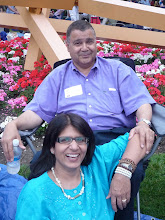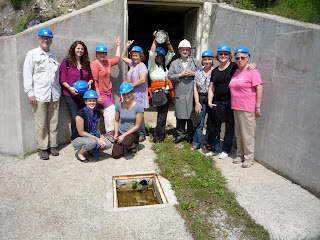Two days ago, on Sunday Sept 11, the new group of volunteers arrived in Macedonia and it reminded me of the sense of anticipation and excitement I had felt the beginning of my adventure. This month, I am once again filled with anticipation of what life holds for me when I return at the end of next month.
We had our official COS (close of service conference) last month in August and through a lottery system picked the dates we leave the country with a new acronym – RPCV (returned Peace Corps Volunteer). It reminds me of graduation – a period of disciplined study, learning, teaching and cross-cultural exchange that officially ends with being presented a diploma or certificate. I will truly treasure my status as a RPCV as I join thousands of fellow volunteers, tied by a common bond of living within the narrow confines of choice in developing countries and finding love, joy and happiness in our lives.
 |
| Vesna Markoska |
I have pulled my two suitcases out of storage and started sorting out the items that I will leave behind, and packing what I will take back with me. Albeit there is so much that I am taking back that doesn’t go into a suitcase and so much that I leave behind that cannot be quantified. I am going home, taking back with me a piece of my adopted country – forever stamped in my heart. A place that I have both loved and hated, a place of successes and failures, of completed projects and projects that never went past the first stage. A place with time filled with cold, excruciatingly lonely days and time rushing past in a blur of activities. A country filled with dreams of a long lost civilization. A place of enduring friendships and a place where I learned to live with strangers and communicate in a new language!
 |
| Cena Noveska and her Mother |
Today I am reminded of the things that I will truly miss. The 50 feet walk to the local green grocer and returning with a couple of bags full of fresh fruits and vegetables that set me back about $3. The grocer smiling indulgently as I buy one tomato, one potato, an onion and a carrot, guessing what meal I am preparing that day. I will miss the friendly conversation with strangers while walking in the forest paths, the friendly ‘toot of the horn’ by the ‘combi’ drivers as they pass me in town and residents inviting me for coffee and then serving the equivalent of a full meal. I will miss the children boldly calling out my name in English savoring the sound of the word. The people will never really think of me as an American - but an Indian living in America. To be entirely honest, many of my fellow volunteers think the same! I will miss walking in the hills with a friend who is afraid of cows, snakes, wild boar and all sorts of strange noises. I cannot quantify the pleasure that comes from gathering fresh tea, herbs, berries and fruit growing alongside the hill paths. I absolutely will not miss my workday as much of it is spent in casual conversations, drinking coffee or tea and sampling the various ‘foods’ and ‘cultural’ events through out the year. I may think back nostalgically about the challenge of teaching English to my colleagues at my work site and incorporating current events, American mores and culture into the lesson plans.
 |
| Karen Dastick and Jasna Trengoska |
In these two years, I have experienced a freedom only a temporary sojourner experiences in a strange land. I will cherish these memories and the friendships with other volunteers, our common shared experiences bringing us together.



















